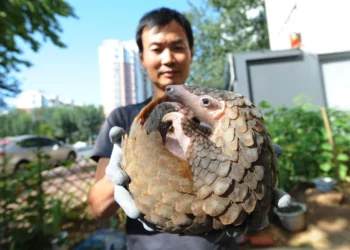Down syndrome is a disease that exclusively affects the human race because the chromosomal system of human beings is different from most animals. However, each species has certain genetic information with a specific sequence, which could cause a delay in development.
Animals with Down syndrome don’t really exist. However, they can have trisomy on another pair of chromosomes. For example, mice have trisomy when they are affected in pair number 16. In this case, the genetic abnormality can cause symptoms very similar to those in humans, such as malformations, cognitive delays, and, in the worst case, reduction of a lifetime.
However, Down syndrome is a disorder with a wide variety of aspects that must be considered further to understand why animals do not suffer exactly this alteration.
Reading suggestions; Cats With Down Syndrome, Myth Or Reality?
What is Down syndrome?
Down syndrome is the most common form of trisomy in the human race, affecting approximately 1 in 700 births. In this sense, it is important to know that the human being has a total of 23 pairs of chromosomes and trisomy 21 is caused by an extra chromosome in this pair, which means that it no longer has 2 chromosomes, but 3. So In general.
Down syndrome is associated with poor cognitive development as well as birth defects and the risk of other complications that decrease life expectancy.
However, the symptoms of this disorder can now be controlled much better than in the past, which has helped to extend the lives of many people, although it really remains difficult to predict, which is why it is a genetic alteration under constant study.
What are the symptoms of trisomy in animals?
The presence of an extra chromosome can have many effects. In people with Down syndrome, it usually presents as some degree of intellectual disability. However, in animals, it can vary greatly from one breed to another.

Among the most common physical symptoms are slightly separated eyes, a flattened face, a short neck, and small ears. Also, they may have white spots on the iris, small legs, loose joints, and poor muscle tone. Also, animals with trisomy can have hearing loss, ear infections, heart defects, and eye diseases, such as cataracts.
Primates with trisomy
In recent years, there have been reports of the odd monkey with Down syndrome or suspected of suffering from it. This is because they are genetically very similar animals to humans, so they can be affected by a disorder similar to Down syndrome.
In this sense, it is important to mention that large monkeys, such as gorillas, have a DNA between 97 and 98% similar to the human genetic code since they have 24 pairs of chromosomes, only one pair more than humans.
In chimpanzees, the abnormality occurs on chromosome 22 and this can cause symptoms similar to those of people with Down syndrome, such as heart disease, underdeveloped teeth, growth retardation, and some eye complications. Also, trisomy cases have been reported in other primates, such as siamangs and macaques.
Reading suggestions; British Longhair – All You Need to Know About British Longhair Cat
Cats with physical abnormalities similar to Down syndrome
Cats with Down syndrome have recently gained popularity on social media, but it is important to note that feline trisomy 21 has not been recognized as a real disorder by the professional veterinary community. Even attributing illnesses based simply on their physical appearance or behavior is strongly discouraged, as it can be seen as disrespectful to those who actually have Down syndrome.

It is possible to see some physical characteristics in some cats that may be similar to people with trisomy 21, but it is necessary to be clear that it is not the same condition. Therefore, it is important to mention that trisomy symptoms occur in cats as a consequence of other health problems, such as neurological diseases, infections, trauma, and other birth defects.
Similarly, some cats suffer from cerebellar hypoplasia, which is a disorder that causes characteristics and behaviors similar to those of trisomy 21, so when you see one of these animals it is easy to think that it is a cat with Down syndrome.
In addition, head trauma can cause permanent physical injury and neurological damage. Also, a poor diet of the cat during pregnancy can cause the kittens to have genetic problems. Therefore, it is always good to feed the animal with cat food according to its age and physical condition.
Can dogs have Down syndrome?
Nor is it scientifically correct to say that there are dogs with Down syndrome. Although there may be some with similar physical characteristics, they are very rare in the world. It is true that genetically dogs and humans have many similarities, but there are some important differences in their genetic code. For example, if you wonder how many chromosomes a dog has, you should know that it has 39 pairs, so it is impossible to find a dog with Down syndrome.
However, dogs can have trisomy and in this case, the most common symptoms are slow growth, large head, wide tongue, short limbs, abnormal heart rhythm, mental boredom, and delayed tooth development.
Also, some developmental disorders in dogs may have some clinical similarities to Down syndrome. An example may be congenital hypothyroidism, caused by low or no thyroid hormone levels, which in turn is a consequence of premature birth.
Finally, it is important to remember that animals with Down are wrongly defined since their anomalies are the consequence of some other type of disability. For more information, it is advisable to seek help from a veterinarian who can provide a better diagnosis and indicate the best possible treatment.









